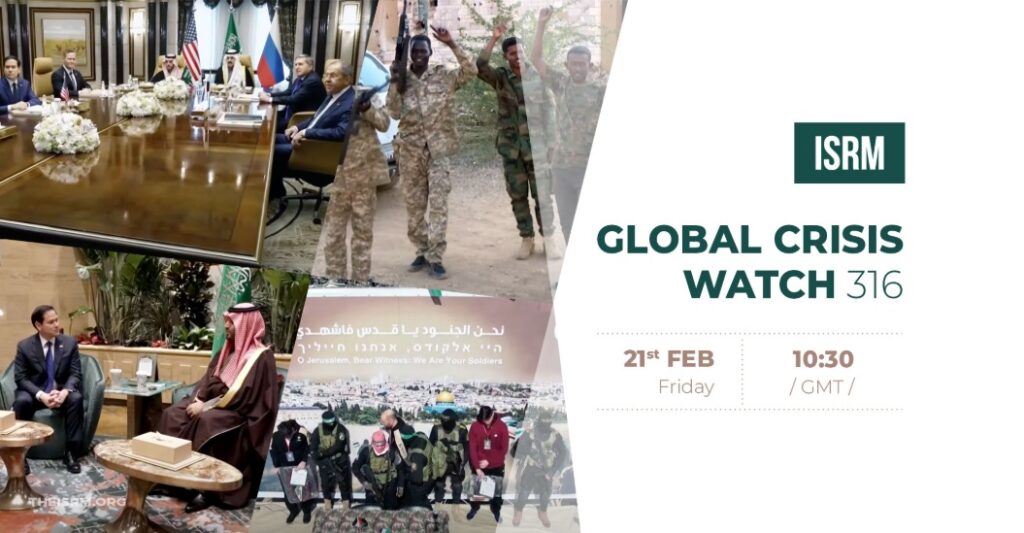The Institute of Strategic Risk Management (ISRM) has announced its latest Global Crisis Watch, number 316, taking place tomorrow, Friday February 21 at 10:30 GMT. This week topics will include, tension in Russia/Ukraine talks as Trump appears to blame Ukraine for war, Hamas offering full hostage release for lasting truce and Israeli withdrawal, Saudi Arabia positioning itself as middleman in Trump-Iran nuclear talks, and paramilitary killings in White Nile State worsening Sudan’s conflict. Read more about the topics, and register, below.
Trump blames Ukraine as US-Russia talks sideline Kyiv
Donald Trump reignited controversy by claiming Ukraine “could have made a deal” to avoid war with Russia, implying Kyiv was responsible for the conflict. His comments followed Ukraine’s exclusion from US-Russia talks in Riyadh, where high-level officials discussed ending the war. Ukrainian President Volodymyr Zelensky dismissed Trump’s remarks as “disinformation” and warned that decisions about Ukraine cannot be made without its participation.
The Riyadh talks, the first direct US-Russia negotiations since the 2022 invasion, saw Russian Foreign Minister Sergey Lavrov reject any NATO peacekeeping presence in Ukraine. US Secretary of State Marco Rubio insisted that “all sides” must make concessions, signaling a shift from previous US policy. Trump expressed confidence in his ability to secure peace, suggesting Ukraine should have accepted territorial losses. He also questioned Zelensky’s legitimacy, falsely claiming his approval rating had dropped to 4%.
Meanwhile, European NATO members, concerned about Trump’s unilateral diplomacy, met in Paris but failed to agree on a unified stance. Germany and Poland ruled out sending troops, while Italy expressed skepticism. Amid these talks, Russia intensified drone attacks on Ukrainian cities, exposing Kyiv’s vulnerability.
Zelensky accused Trump of enabling Russia’s diplomatic resurgence and confirmed Ukraine had rejected a US proposal to trade mineral rights for military aid. His criticism highlights growing tensions between Kyiv and Washington as Trump reshapes US policy, leaving Ukraine increasingly isolated.
Hamas offers full hostage release for lasting truce and Israeli withdrawal
Hamas has offered to release all remaining captives in Gaza in exchange for a lasting ceasefire and a full withdrawal of Israeli forces. Hamas spokesperson Hazem Qassem outlined the proposal as part of the second phase of the ceasefire agreement, while firmly rejecting Israeli demands for disarmament or Hamas’ removal from Gaza.
The group has also agreed to double the number of captives set for release on Saturday, from three to six, following requests from mediators. This move comes amid growing international pressure and calls from families of the remaining hostages for their immediate release. The proposal also follows criticism from US President Donald Trump regarding the phased release process.
Despite the ceasefire, Israel has maintained restrictions on essential supplies and reconstruction materials entering Gaza. Hamas previously threatened to delay the hostage exchange due to these restrictions, demanding that mobile homes and heavy equipment be allowed in. The humanitarian toll continues to rise, with Gaza’s Ministry of Health reporting over 48,000 deaths, while the Government Media Office estimates the toll to be at least 61,000, including those still trapped under rubble. Rebuilding Gaza is projected to cost $53.2 billion.
As phase one of the fragile ceasefire continues, negotiations over phase two remain uncertain. Analysts suggest Israel, despite its military advantage, has been unable to decisively defeat Hamas, leaving both sides locked in a high-stakes political and humanitarian crisis.
Saudi Arabia positions itself as middleman in Trump-Iran nuclear talks
Saudi Arabia is exploring a role as a mediator between the Trump administration and Iran in an effort to revive negotiations on a new nuclear agreement. While no formal proposal has been made, Riyadh sees an opportunity to use its strong ties with Trump to offer Tehran a diplomatic bridge to Washington. Saudi officials believe a new deal could prevent Iran from pursuing nuclear weapons, a concern heightened by Tehran’s weakened regional influence.
Tensions between Saudi Arabia and Iran have significantly eased since their 2023 China-brokered reconciliation. The agreement brought key benefits to Riyadh, including an end to Houthi attacks and reduced threats from broader regional conflicts. Saudi leaders now prioritize economic stability over geopolitical rivalries and view diplomacy as the best path forward.
Trump has reiterated his willingness to negotiate a new nuclear deal, recently stating he prefers a “verified nuclear peace agreement” that allows Iran to develop peacefully while preventing it from acquiring nuclear weapons. However, Iran’s leadership remains divided. President Masoud Pezeshkian has expressed openness to talks, but Supreme Leader Ayatollah Khamenei has dismissed negotiations with Washington as “not smart.”
Saudi Arabia’s growing diplomatic influence reflects its broader strategy of balancing alliances. While maintaining close ties with the US, Riyadh has expanded relations with China and Russia. Experts suggest that Saudi mediation will likely be more symbolic than transformative, but its evolving role in regional diplomacy remains significant.
Paramilitary Killings in White Nile State: Sudan’s Conflict Worsens
Over 200 unarmed civilians were killed execution-style by Sudan’s paramilitary Rapid Support Forces (RSF) in a brutal three-day assault on the villages of al- Kadaris and al-Khelwat. The army-backed government claims the death toll is even higher, at 433, including children. Survivors described mass executions, kidnappings and looting, while hundreds more were reported wounded or missing, many feared drowned while attempting to flee across the White Nile.
The attacks come amid a near two-year conflict between the RSF and Sudan’s army, which once ruled together but fell out over a transition to civilian rule. Both sides have been accused of war crimes, with the RSF also facing US allegations of genocide in Darfur.
Recent fighting has intensified as the army attempts to reclaim Khartoum, having recently regained control of parts of the capital and nearly all of the strategic Gezira State. The RSF, facing setbacks, has moved to consolidate power in Darfur and Kordofan, with reports that its leaders are preparing to form a rival government.
The UN has condemned the massacre and received reports of widespread sexual violence and forced displacement. The war has left tens of thousands dead and displaced over 12 million people, creating what aid groups call the world’s worst humanitarian crisis. Human rights organizations have called for an expanded arms embargo and increased accountability for atrocities committed by both factions.
Plus, all the stories that are catching our attention wherever we live in the world. Feel free to join and add your voice to the conversation.
For more ISRM news, click here






